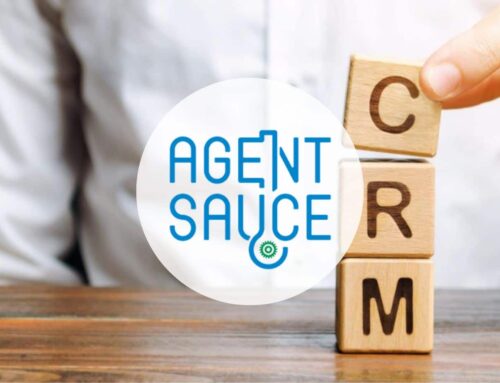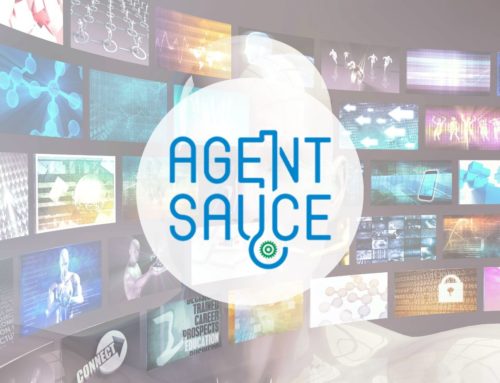A key feature of any Real Estate CRM is that it should make your job easier and less time consuming. Our Real Estate CRM is designed to do just that. Combined with our real estate lead generation and real estate marketing automation tools our Real Estate CRM enables you to collect and act on more data about your contacts and real estate leads than ever before and spend less time doing it. Organize contacts by source, relationships, interests, score and more. We put everything you need to know about your contacts and leads in all in one place.
The Contact Manager, Lead Tracker, Action Plans, Action Items, and Email Marketing System make up the core of our Real Estate CRM. In our Plus program these features are further enhanced with Real Estate Social Marketing, Referral and Testimonial Engines, Inbox Scanner, SMS/Toll Free Call Capture, Virtual Tours and Mobile App for account management on the go. Learn More:
Real Estate Contact Manager
The Agent Sauce Real Estate Contact Manager will help you:
- Import and Manage Contacts
- Track Relationships
- Track Lead Status
- Track Opportunity Amounts
- Track Closing Information
- And More!
Real Estate Email Marketing
Our Real Estate Email Marketing system was built from the ground up for Real Estate agents. Some of our features include:
- Monthly Newsletter
- Real Estate Specific Templates (Just Listed, Just Sold, etc…)
- Simple drag and drop email create your own email designer.
- Drip Campaigns
- E-Cards
Real Estate Action Items
With our unique real estate action system you can assign a number of different tasks to different contacts and be reminded on a regular basis as to when each item is due. Use daily email reminders, calendaring options, and in dash lists to help you keep in touch with your sphere.
Real Estate Lead Manager
The real estate lead manager integrates lead management and status tracking into a robust Real Estate CRM that enables you to effective measure buyers, sellers, opportunity amounts and much more.
Real Estate CRM Podcast
Take Aways for Real Estate CRM
- Ease of use is one of the most important features.
- A Real Estate CRM should be more than just a contact database. It should have lead generation and marketing automation features as well.
- Data must be able to be quantified with metrics .
Real Estate CRM Show Notes
- Real Estate CRM Features [1:30]
- What is a Real Estate CRM [2:30]
- Maintaining Touch [4:00]
- Marketing Automation [5:55]
- Real Estate Lead Tracking and Activity Tracking[8:30]
- Real Estate CRM use is like investing or momentum [11:50]
- Things to look for in a Real Estate CRM [13:00]
Real Estate CRM Podcast Transcript
Adam Small: Hi there. Adam Small here with Agent Sauce, and this is the Real Estate Marketing podcast. With me, as always, is Doug Karr of DK New Media.
Doug Karr: I’m here.
Adam Small: That’s good to know. Otherwise, I’d be seeing things.
Doug Karr: Wouldn’t be much of a conversation with only one person.
Adam Small: Well, I’d be the smartest guy in the room.
Doug Karr: You do talk to yourself a lot.
Adam Small: How are you doing today, Doug?
Doug Karr: Fantastic.
Adam Small: Good to know. Listen, so today I thought we could go over what a Real Estate CRM is and talk about the features, and the reasons to have it, that sort of thing. What do you think?
Doug Karr: I like it. You said before when we were talking about this subject, “Man, this might be boring.”
Adam Small: I was a little concerned, because you define things, and the last thing I want is for people to go, “I already know this.”
Doug Karr: Yeah, I think a lot of people know about Real Estate CRMs, but I think people make the mistake of not using them.
Adam Small: I’ve run into that many a time.
Doug Karr: They think, “This is going to be a pain in the butt. I got to record everything. This is too much hassle.” So they don’t see the return on investment.
Adam Small: I guess that that right there is probably the number one feature of a Real Estate CRM that you want is usability. Right?
Doug Karr: Yeah, absolutely. If it’s hard to use, and you got to change all your processes, and slow down, and you’re entering data two hours a day, you don’t want it.
Adam Small: Yeah. It’s funny, because you’ve heard me say it before, and I think I’ve even said it on the podcast before. Technology should be an enabler of business, not a disabler of business. It can be done in a lot of ways, processes, and hard to use software, where you’re required to change your process and the way you do business to suit the software, just isn’t going to fly.
Doug Karr: Right, exactly.
Adam Small: So you might want to make sure, no matter what you’re looking at, whether it be a Real Estate CRM, or a word processor, whatever it is, you want to make sure that it enables you to do the job you want to do, not changes the way you have to do things. Yeah, I guess that’s the first feature.
Let’s talk about the general overview of a Real Estate CRM. What is a CRM, in general?
Doug Karr: It’s basically a database. It’s a customer database, and it’s for helping build relationships. It’s a customer relationship management system.
Adam Small: It’s a lot more than just a Rolodex, though. With a Real Estate CRM, not only do you collect the basic of information about somebody, name, email address, phone number, that sort of thing, but you also record your contacts and your information with them. I talked to them on this day, and I emailed them on this day, and I phone called. Even social media interactions with them can all go into it so that you have this running history of the relationship with that person.
The good Real Estate CRMs have a nice feature that will remind you it’s been 30 days since you talked to this guy. Maybe you need to talk to him. The way it ideally should work is that you can grade them, grade your contacts, A, B, C, D, that sort of thing. Then put a rule on there that says, “My A customers, I want to be talking to them every two weeks. And my B contacts, I want to be every month or every quarter. And my Cs are every six months, and my Ds are once a year.”
It’s just a matter of touching base with a lot of it. If you’ve got a good email marketing program going, that can substitute a lot of it, but you still want to get that personal touch in there.
Doug Karr: Yeah, I think the hard part nowadays is for people to maintain touch with everybody. The Real Estate CRM, where it can save you time, is if you already know that you had sent an email out, and the person clicked through on it, now maybe it triggers you to give them a call. Or maybe you say that’s great. I touched them this month. I’ll touch them again next month.
There’s times where it’s going to save you a lot of time, and there’s other times where it’s going to keep you accountable, that holy smokes, I didn’t follow up with that person that I said that I was going to. How many times does that happen to us personally?
Adam Small: Right, where you say, “Hey, I’ll email that over to you tonight, or this afternoon, or whatever.” Then you get caught up in something else and completely space it. Three days later, you remember. The terrible thing about that is that three days later may be too late. You may have lost the sale. You may have lost the opportunity.
Doug Karr: I think the other one too is that the Real Estate CRM’s capabilities are to capture every touchpoint nowadays. When Real Estate CRM first came out, that was a manual process. If you called someone, you had to open up your Real Estate CRM, log it in-
Adam Small: And putting all the data in, right?
Doug Karr: The nice thing nowadays is that emails clicks, email opens, email sends. Even phone calls, if it’s a click to call, and everything else. A lot of times, the functionalities is in these systems that it records the interaction so that you don’t have to. I think now we’re starting to say now I don’t just have an ROI on it. Now I’m going to increase my ROI, because it’s going to maintain all of that connection relationship and how valuable that person is to me.
Adam Small: Right, and it’s funny, because Real Estate CRMs have really grown up in the last few years, more so than just data collection points, where you’re manually inputting data in, like you said. Now there’s the marketing automation piece to it, as well. Not only that, but it’s also the ability to capture that data in other areas, like you said.
When they visit your website, guess what? You can actually identify them and put in their contact sheet, so and so has been to my website eight times now. Then you can pop a rule on there and say if they visit the website more than five times in a given week or something, it pops up and says you need to contact Joe, that sort of thing.
The Real Estate CRMs are really becoming much more than just the contact sheet and repository of data. When you start getting into the automation piece-
Doug Karr: It’ll start triggering things, yeah.
Adam Small: Yeah, so the value there becomes exponential, because not only can you actually have visibility into where they’re doing their actions, where they’re taking actions in so far as online text messages, phone calls, emails, and that sort of thing, but you can also set the automation rules up that trigger you to take action because somebody met a certain criteria. That’s also a great thing with Real Estate CRMs. They’re becoming automated marketing platforms, is what they are.
Doug Karr: Yeah, they’re connecting to everything. The capabilities, I know, you’ve enhanced the ones in Agent Sauce significantly over the years, adding events that are happening to people, and building triggers off of them, and everything.
Adam Small: Right, like I said, rules with when they open email, when they get a text message lead on a home, when they respond to an email, click on links. Opening and reading an email’s great, but once they start clicking on links and even the type of link … if it’s a listing link instead of a [crosstalk 00:07:39].
Doug Karr: Yeah, now you know they’re hunting.
Adam Small: … blog, you know that at least something piqued their interest, and it might be time to reach out and touch them. That’s all technology and automation going on there. Beyond that though, what other things are being done with Real Estate CRMs?
Doug Karr: One thing is, obviously, you’re collecting data. In the cloud, you’re collecting data in a place where it’s safe. That’s always good. You have people that they swear by their Franklin planner. I’m not knocking that. Franklin planners are great, but you lose your Franklin planner, or you lose your Rolodex, or you lose whatever, or you have a fire, you’re done. One thing that’s great about the Real Estate CRM is that it’s in the cloud. It’s backed up. It’s secure. Nobody can access it. That’s one thing.
The big one too for companies, if you got more than one employee, even if you just have one employee, you don’t want that employee making contact with all kinds of people that you’ve built a relationship with, and you don’t have a record of that. You need to be able to say if I’m going out to lunch with Amy, I should look it up in my Real Estate CRM and see my employee was just talking to her last week about that problem. Let me call him first, see what happened with that. Then when I sit down with Amy, we can talk about how that happened.
That, to me, is the big one is that we tend to balance these relationships between employees, or I’m sure in real estate, it’s between agents or brokers. The thing is, is you want to own the history of that so that when you go to look someone up, you know exactly where you stand, because there’s no worse problem than calling someone, and they said, “So and so just talked to me yesterday, and I told them not to call me.”
Adam Small: Exactly, or something that we encountered early on before we really turned Agent Sauce into a Real Estate CRM was that we would get a support request of some sort. One person would call the person that was making the request. They would take care of it. Then 20, 30 minutes later, another employee would call that person up and say, “Can I help you out with this?” Because you’re trying to be proactive and get things taken care of. We didn’t have a real good way of keeping track of those things really early on, before we turned Agent Sauce into a Real Estate CRM.
Now, of course, we’ve got all of our customers in our Real Estate CRM. Before we make any call to respond to a support request or anything like that, we look up that customer in the Real Estate CRM and see who talked to them, when they talked to them, what they talked to them about, so we know all of the most recent activity that’s occurred. That’s a great way for a tech company to work with it.
But a real estate company is the same way. They can pick up the phone. They can look up their contact, pick up the phone, and say, “Last time we talked, it was six months ago.” And we talked about how they’d be ready to buy in the next six to nine months and that they were looking for a three-bedroom, two bath house, with a 50 acre yard, whatever it may be. Of course, they want it for $10.
The thing is is that it helps keep you on track with that. If it was John Doe that spoke to them instead of you, you can still say these are the notes and you understand where to pick up.
Doug Karr: Right. It’s tough for people to get into that habit of recording each person that they meet, and putting it in there, and stuff. What we’re trying to get at here is yes, you’re right, it’s going to take two more minutes to add that person in there, and save them, and everything else. But that two minutes might get you a home sale six months from now.
Adam Small: Right, exactly.
Doug Karr: That’s the rub is, if you keep working at it, it’s just like everything else with digital marketing, it’s momentum. As your database is cleaner and more complete, you’re able to make better decisions. You’re able to, like you said, score and order your list more effectively. You make less mistakes, keep in touch with people more. It’s just going to make you far more efficient on the sales and marketing side.
Adam Small: When you start combining the Real Estate CRM with marketing automation, that’s where you really start to see value. Because again, like we said earlier, it can do a lot to remind you, but when you start dropping drip campaigns and stuff like that in there from an email perspective, that constant touch, again, it helps build that relationship with that person.
Yeah, Real Estate CRMs can be a great tool, as long as you’re using it, as long as it’s not forcing you to do a lot more work to get the benefit out of it. What are some things to look for in a good Real Estate CRM, Doug?
Doug Karr: You mentioned earlier, and one I would say, is automation, so like click to call. We worked with a company once that was working with Salesforce. Their sales people had to click like 11 times to record that they made a phone call with someone, literally, because you had to log in, click, click this tab, then click this, then do a search, then click and find the person, then click in the section. It was something that it was a demotivator. The sales people just hated it. The first thing was people figured out how to program. How do I just make a list that people can call and click.
The first thing I would look for is, what are the pieces of it that are automated, and what’s manual, based on my process. If I was one of your agents, or I would say, when I meet someone new who’s possibly a prospect, how do I record their information? And how do I set a reminder for myself to go back and talk to them? How do I do those things? If this is going to take longer, then you’re going to be dissuaded. You’re just not going to want to do it.
Adam Small: If it’s difficult, you’re disincentivized. You’re just not going to do it. Even if you say you have to, people just aren’t going to do it. It’s as simple as that.
Doug Karr: But if you see … you built the mobile app of the card scanner. Now, I don’t even have to type their information in. I can just take a picture. Oh my God.
Adam Small: Yeah, so much easier.
Doug Karr: Things like that are what you should be looking for is, how do I make my life easier with a Real Estate CRM. Then I think the second half of it is how is that data accessible for me to look. I want to look at it, and like you said, score these people and say how can I sort these people. I’m over in this section of town today. How can I get a list of those people that are around there that I should go call on, or whatever.
A lot of these Real Estate CRMs are weird, where a lot of that’s hidden. Your own data is hard to find.
Adam Small: Hard to find, hard to run reporting on. Hard to dig in and really drill down on things.
Doug Karr: That’s the second part of it, I would say, is easy in, easy out. How do I get a hold of it and make decisions with it?
Adam Small: Right, right, right, so good reporting platform, maybe even the ability to categorize. We implemented tags last year so that you could just do a free-form categorization on anybody.
Doug Karr: Nice.
Adam Small: You can run reports on it, say show me everybody that lives on the East Side. Or show me everybody that I met at this event that I went to on the 4th, or whatever, or at this particular open house, or whatever it may be. The hardest part with that was making it so that it’s accessible across the board, not only from a reporting perspective where you can say show me everybody with this tag, but also where you could say I want to send an email to the people with these tags.
Doug Karr: That’s cool. If you had a list of real estate investors, you could just tag them all investor. Then when you see a property that comes open that’s perfect for an investor-
Adam Small: Create an email. Send it to them.
Doug Karr: Yeah.
Adam Small: Just select the investors on the tag, and away it goes.
Doug Karr: Nice.
Adam Small: Again, trying to make it work better for you. I would agree, I think that categorization, the ability to act on the data you’re collecting. It would be great if you could tag everybody, but it wouldn’t be great if you could not do anything with it. Great, I can tag them, but what do I do with it?
Doug Karr: Yeah, so I tagged them, categorized them, scored them, but I can’t actually do anything with that.
Adam Small: There’s nothing to do with them at this point. Yeah, so usability, number one, I would agree, just ease of use in order to actually be able to use the system. But then also being able to use the data in a metric type of way, a reporting type of way, more so than just the actual functional use of the system. I would agree.
This has been Adam Small and Doug Karr with the Real Estate Marketing podcast. Thanks for listening, and have a great day.







